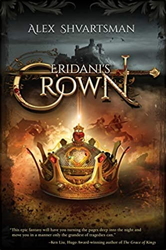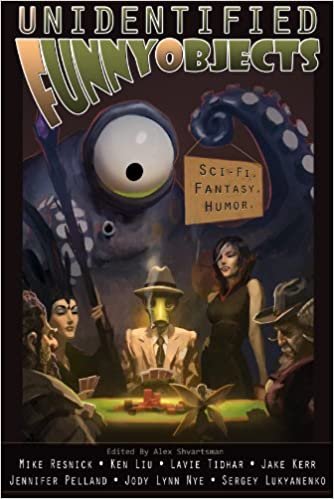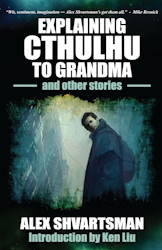
I spent the weekend virtually attending a convention, giving a reading, answering questions at a Kaffeeklatsch, and holding forth on panels at Capclave. In other years, this is my favorite regional con, and only in small part to the opportunity to stop at a Waffle House on the way there. I also typically put together a dinner party one night at La Canela, an incredible Peruvian restaurant a short drive from the convention hotel. Alas, an online event meant I was foraging for my meals at home rather than the usual haunts, but even so I had a fine time at Capclave, checking in with fans and friends and colleagues whom I have not seen for a year or more, which is often how things go at the in-person version of the convention.
It’s only fitting then that this week’s EATING AUTHORS guest is Alex Shvartsman, who has not only joined me for Peruvian cuisine in the course of the convention, but has on several occasions been my roommate. I am here to tell you that Alex is a terrible person to share a room with. After a long night of schmoozing and socializing and party-hopping at the convention, every time I have shared a hotel room with Alex we have wound up talking for hours — literally, hours — despite our best intention to get some sleep and regardless of how exhausted we were from the day’s events. Good times.
Nowadays, Alex is well known as the editor and publisher of the Unidentified Funny Objects series of anthologies. In recent years he’s also applied his editorial skills to running the online magazine Future Science Fiction Digest which (full disclosure) published my own work in their #1 issue. That would surely be enough bonafides for anyone, but there’s more. Back in the day Alex was a professional Magic: The Gathering player, and at one time held the record for the most top eights on the Grand Prix (21!).
He also owns and operates Kings Games, an internet cafe and gaming store in Brooklyn, NY, is renowned for his expertise in crafting Kickstarter campaigns, frequently works as a translator, and despite all of that somehow also finds time to write fiction of his own. His short stories have graced the usual range of magazines and markets, and last year he self-published the novel Eridani’s Crown.
This tine of year, before making the drive down to Capclave, Alex would usually stop and pick up a nice assortment of fine New York bagels to share with friends at the convention. Alas, that treat has been another victim of the current pandemic.

LMS: Welcome, Alex. I’ve been waiting a long time to have you tell me the tale of your most memorable meal. What is it?
AS: I used to travel extensively when I was younger, having visited over thirty countries and every inhabited continent. I’ve dined on fresh vegetables grown on site at an Israeli kibbutz, and exotic fruits from the Amazon River basin; chicken satay at the Kuala Lumpur night market in Malaysia and springbok steak in South Africa. In those travels I’d learned the golden rule of gastronomic tourism: get away from the tourist traps and ask the locals to direct you to their favorite eating establishments. But it wasn’t this plethora of fancy dishes that is evoked when thinking of my most memorable meal; it was a humble burger with fries from McDonald’s.
Before you foodies boo me off this virtual stage and pelt me with rotten chicken nuggets, hear me out, for I’m with you. As a resident of Brooklyn I’m surrounded by amazing food and could dine in (or order out in these pandemic days) at a different great restaurant every day for a year without ever running out of quality options. The only times I recall eating at McD’s in the past two decades were in Japan, where fast food actually looks like what’s displayed on the menu photos. But this meal predates that by another decade, and there’s a story to it besides.
The year was 1990, and I was a fourteen-year-old kid growing up in the port city of Odessa, USSR. The past few years had been an amazing time. I watched as the newfangled policies of perestroika and glasnost literally transformed Soviet society. It was suddenly possible to say controversial things without the risk of being questioned or arrested by the KGB. It was permissible to attend a church or a synagogue. It was okay to open a business—or, as it was phrased back then, “join a cooperative.” My father, an engineer who earned a meager salary until then, had done so and we were suddenly on the upward financial trajectory from lower middle class well into its center. We could afford a VCR and were even dreaming about possibly buying a car (but really, that was upper middle class talk!)
The most important change for me personally was the sudden influx of books. With new independent small presses flourishing, there were suddenly far more than a handful of science fiction translations published each year, and I gorged on Edgar Rice Burroughs and Leigh Brackett and Edmond Hamilton.
While I largely experienced the positive aspects of the changes, my parents were far more concerned. The Soviet Union began breaking apart. Several Baltic states had already seceded, and many other republics and even smaller regions were also planning to. There was plenty of separatist talk even in the Russian-speaking Odessa, let alone other parts of Ukraine. As ever, the rising nationalism stirred up the racist and Anti-Semitic elements of society. There was much speculation of various civil wars brewing across the vast territory once under the firm grasp of Russian communists. Popular wisdom was that the country would be engulfed in war or multiple smaller wars in the next five years.
Worse yet, I was a few years away from becoming of age to enter military service. Draft was mandatory then for anyone who didn’t get into a university. Higher education institutions had strict and racist quotas, making it difficult for Jewish kids to enroll, even if their grades warranted it. So the odds were I would have to serve in the military, and possibly go to war.
We had distant relatives in America, but even a few years prior, it was impossible to legally move from the USSR to the United States. A complex process had to be followed by anyone who desired to do so.
A Jewish person could apply to immigrate to Israel—it was difficult but not outright impossible to receive government permission for this. At the time the USSR did not have diplomatic relationships with Israel, so anyone leaving the country for Israel would travel to neutral Austria first. In Austria, one would request political asylum and refugee status at the American embassy and then travel by train to Italy where they awaited the American government’s decision. People lived in Italy for many months, and sometimes over a year, as stateless refugees. Ultimately though, most gained access to the preferred promised land of their choice.
My mother was the driving force behind our family’s efforts to emigrate. My father reluctantly agreed, only because of looming potential danger they perceived for me in the coming years. We were prepared to follow the complicated path described above when the game changed and it was suddenly possible to apply for refugee status at the American embassy in Moscow. No more months spent in uncertainty, but instead the potential to board the plane at Sheremetyevo Airport for a direct flight to New York!
And so, our family booked an appointment at the embassy and boarded an overnight train to Moscow.
Prior to and during this trip my mother drilled us on how and what to say to our interviewer. This person literally held our future in their hands; they would decide whether we experienced sufficient hardship and qualified for refugee status, so there could be no mistakes.
I never understood the need for this preparation. The idea of being a persecuted minority was not hypothetical to us. In first grade I had my nose broken by a bully for the crime of being Jewish. My father’s colleagues in Western Ukraine, where he frequently traveled for work, had unironically said to him on numerous occasions, “You’re one of the good ones. When the pogroms start, we’ll hide you.” The way I saw it, all we had to do during this interview was tell the truth.
The interview itself was anti-climactic. It lasted less than ten minutes and we were asked a few standard questions by a bored clerk who must’ve had asked them, and heard the same or very similar answers, many times each day. To be honest, I don’t remember that much about it, but I remember what happened afterward.
We went to McDonald’s.
At the time, this was the first and only McDonald’s in all of the Soviet Union. It opened its doors in January of that year, and people—Muscovites and visitors alike—lined up to sample exotic American food.
Soviet citizens were not exposed to a wide range of international cuisines. Although I grew up in a multicultural port city, by the time we left the USSR I had never tried Chinese food, not eaten a bowl of cereal. Bananas were imported by ship once or twice a year and everyone had queued up and bought green bananas, then enjoyed them as they ripened and really made them last for the next few weeks; it was a big deal. The concept of pizza was very new, and what enterprising restaurateurs served would likely never be mistaken for pizza elsewhere.
No one we knew had ever tried burgers.
The concept of meat patties was, of course, familiar. Cutlets of all kinds are a staple of Russian cuisine. But an actual burger, prepared and served the way you think of it, that was altogether new.
Even after several months, the interest hadn’t died down. We spent upward of an hour in line before we could get inside the McDonald’s. What few tables the place had were occupied—we got the food to go, which was also a rather novel concept for prepared food in Russia (at least to my teenage self!). We bought various burgers and fries, and we bought ketchup packets—the sauce wasn’t free the way it is in American restaurants. Like most things, ketchup was difficult to get in stores and most customers purchased extras to use at home.
We returned to the apartment we were staying at and unwrapped the food. I remember the meal vividly. The rich, unfamiliar flavor of Big Mac sauce. The texture of French Fries—so unlike the commonplace potatoes fried on a skillet. I remember it not because it was necessarily better than other meals, but because of how different it was from anything I was used to. It was the glimpse at the wide range of possibilities that were about to open up to me. It was my first taste of America.

Thanks, Alex. There’s something both disturbing and perfect about a Big Mac as a metaphor for America. Special sauce indeed.
Next Monday: Another author and another meal!

NB: links to authors and books here are included as part of an Amazon Affiliate account. If you follow any of them and ultimately make a purchase Amazon rewards me with a few pennies of every dollar.
Want to never miss an installment of EATING AUTHORS?
Click this link and sign up for a weekly email to bring you here as soon as they post.
#SFWApro
Tags: Eating Authors



